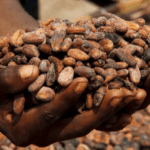
Some international buyers of Ghana’s cocoa have started advancing part of more than $4 billion to COCOBOD for cocoa bean purchases for the 2025/2026 crop season.
JoyBusiness has learned that the full amount will not be released at once but spread over a period. However, sources say a significant portion is expected before the end of this year.
The move by global traders is to secure the necessary commitment from COCOBOD for bean supply.
COCOBOD’s New Financing Deal
In 2023, COCOBOD introduced a new funding model for cocoa purchases, requiring global traders to deposit at least 60% of the value of their forward contracts at the start of the season.
This system replaced the three-decade-old pre-export syndicated loan from international banks.
Part of the traders’ deposits will be used to finance purchases from farmers through existing partnerships with licensed cocoa buying companies (LBCs). In this arrangement, traders fund LBCs to buy cocoa while COCOBOD acts as an intermediary.
Impact on the Cedi
Analysts argue that apart from cocoa farmers, the cedi will be one of the biggest beneficiaries of these inflows, as they could significantly boost the Bank of Ghana’s international reserves.
The Bank’s Economic and Financial Data released in July put Ghana’s reserves at $11.1 billion.
Bank of Ghana Governor, Dr. Johnson Asiama, in an exclusive interview with JoyBusiness’s George Wiafe, said the inflows should signal to the market that the central bank is well-positioned to intervene when needed to meet the demands of businesses and commercial banks.
Dr. Asiama maintained that the development shows a favourable outlook for the cedi despite recent pressures. “As regulator, we have taken the needed actions to ensure that things do not get out of hand,” he assured.
He added that Ghana’s macroeconomic situation remains solid and should give businesses confidence in the cedi’s outlook as well as in ongoing measures to improve market liquidity.
JoyBusiness has also learned that the country could receive additional inflows from development partners, which should further strengthen international reserves.